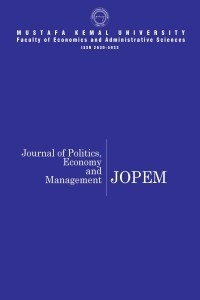Abstract
The refugee crisis, which we can say is a big problem for every society today, is being questioned again with the concept of cosmopolitanism. The focus at this point is the acceptance of the unlimited scope of human existence and the desire to engage in a non-hegemonic dialogue. Cosmopolitanism thus emphasizes new kinds of moral and political virtues and aims to develop a sense of global responsibility. In particular, the extraordinary interaction network we are in today and the effects it creates point to the normality of encountering those who are different from oneself and, as a result, necessitate the development of responsibility and goodwill between people. In this sense, the study focuses on the legitimacy of being different through cosmopolitanism and uses the ideas of Immanuel Kant (1724-1804) and Jean-Jacques Rousseau (1712-1778) as a basis.
References
- Appiah, K.A. (2017). Kozmopolitizm (Çev. F. Gülfidan). Ankara: Nika Yayınevi.
- Bauman, Z. (2021a). Kapımızdaki Yabancılar (Çev. E. Barca). İstanbul: Ayrıntı Yayınları.
- Bauman, Z. (2021b). Küreselleşme (Çev. A.E. Pilgir). İstanbul: Ayrıntı Yayınları.
- Benhabib, Ş (2018). Ötekilerin Hakları Yabancılar, Yerliler, Vatandaşlar. İstanbul: İletişim Yayınları.
- Benhabib, Ş. (2017). Buhran Çağında Haysiyet. İstanbul: Koç Üniversitesi Yayınları.
- Calhoun, C. (2008). Cosmopolitanism and Nationalism. Nations and Nationalism, 14(3), 427-448.
- Chambers, I. (2019). Göç, Kültür, Kimlik (Çev. İ. Türkmen & M. Beşikçi). İstanbul: Ayrıntı Yayınları.
- Connolly, W.E. (2020). Kimlik ve Farklılık. (Çev. F. Lekesizalın). İstanbul: Ayrıntı Yayınları.
- Held, D. (2003). Cosmopolitanism: Globalisation Tamed. Review of International Studies, 29, 465-480.
- İstanbullu Alisbah, E. (2022). Yurtsever bir Evrenselciliğin İmkânı: Kwame Anthony Appiah’ta Kısmi Kozmopolitanizm. Social Mentality and Researcher Thinkers Journal, 8(66), 492-2499.
- Kant, I. (2023). Ebedi Barış üzerine Felsefi Bir Tasarı (Çev. C. Yeşilçayır). Ankara: Fol Kitap.
- Kearney, R. (2022). Yabancılar, Tanrılar ve Canavarlar (Çev. B. Özkul). İstanbul: Metis Yayınları.
- Ossewaarde, M. (2007). Cosmopolitanism and The Society of Strangers. Current Sociology, 55(3), 367-388.
- Parekh, B. (2003). Cosmopolitanism and Global Citizenship. Review of İnternational Studies, 29, 3-17.
- Rousseau, J.J. (2023). İnsanlar Arasındaki Eşitsizliğin Kaynağı ve Temelleri (Çev. A.K. Paksoy). Ankara: Doruk Yayınları.
- TBMM (2023). Cenevre'de 1951 tarihinde imzalanmış olan Mültecilerin Hukuki Durumuna dair Sözleşmenin tasdiki hakkında kanun tasarısı ve Dışişleri Komisyonu raporu (1/125). https://www5.tbmm.gov.tr/tutanaklar/TUTANAK/KM__/d00/c002/km__00002024ss0053.pdf (Erişim tarihi: 2.12.2023)
Abstract
Günümüzde her toplum için büyük bir problem olduğunu söyleyebileceğimiz mülteci krizi, kozmopolitanizm kavramı ile yeniden sorgulanmaktadır. Bu çerçevede odak noktası, insan varlığının sınırsız kapsamının kabul edilmesi ve hegemonik olmayan bir diyaloğa girme isteğidir. Kozmopolitanizm, yeni türden ahlaki ve politik erdemlerin altını çizmekte ve küresel sorumluluk duygusunu geliştirmeyi amaçlamaktadır. Özellikle günümüzde içerisinde bulunduğumuz olağanüstü etkileşim ağı ve bunun yarattığı etkiler, kendinden farklı olanla karşılaşmanın olağanlığına işaret etmekte ve neticede insanlar arasında sorumluluğun ve iyi niyetin geliştirilmesini gerekli kılmaktadır. Bu anlamda çalışmada, farklı olmanın kozmopolitanizm ile meşruiyeti üzerinde durulmakta ve dayanak noktası olarak Immanuel Kant (1724-1804) ile Jean-Jacques Rousseau’nun (1712-1778) fikirlerine yer verilmektedir.
Keywords
References
- Appiah, K.A. (2017). Kozmopolitizm (Çev. F. Gülfidan). Ankara: Nika Yayınevi.
- Bauman, Z. (2021a). Kapımızdaki Yabancılar (Çev. E. Barca). İstanbul: Ayrıntı Yayınları.
- Bauman, Z. (2021b). Küreselleşme (Çev. A.E. Pilgir). İstanbul: Ayrıntı Yayınları.
- Benhabib, Ş (2018). Ötekilerin Hakları Yabancılar, Yerliler, Vatandaşlar. İstanbul: İletişim Yayınları.
- Benhabib, Ş. (2017). Buhran Çağında Haysiyet. İstanbul: Koç Üniversitesi Yayınları.
- Calhoun, C. (2008). Cosmopolitanism and Nationalism. Nations and Nationalism, 14(3), 427-448.
- Chambers, I. (2019). Göç, Kültür, Kimlik (Çev. İ. Türkmen & M. Beşikçi). İstanbul: Ayrıntı Yayınları.
- Connolly, W.E. (2020). Kimlik ve Farklılık. (Çev. F. Lekesizalın). İstanbul: Ayrıntı Yayınları.
- Held, D. (2003). Cosmopolitanism: Globalisation Tamed. Review of International Studies, 29, 465-480.
- İstanbullu Alisbah, E. (2022). Yurtsever bir Evrenselciliğin İmkânı: Kwame Anthony Appiah’ta Kısmi Kozmopolitanizm. Social Mentality and Researcher Thinkers Journal, 8(66), 492-2499.
- Kant, I. (2023). Ebedi Barış üzerine Felsefi Bir Tasarı (Çev. C. Yeşilçayır). Ankara: Fol Kitap.
- Kearney, R. (2022). Yabancılar, Tanrılar ve Canavarlar (Çev. B. Özkul). İstanbul: Metis Yayınları.
- Ossewaarde, M. (2007). Cosmopolitanism and The Society of Strangers. Current Sociology, 55(3), 367-388.
- Parekh, B. (2003). Cosmopolitanism and Global Citizenship. Review of İnternational Studies, 29, 3-17.
- Rousseau, J.J. (2023). İnsanlar Arasındaki Eşitsizliğin Kaynağı ve Temelleri (Çev. A.K. Paksoy). Ankara: Doruk Yayınları.
- TBMM (2023). Cenevre'de 1951 tarihinde imzalanmış olan Mültecilerin Hukuki Durumuna dair Sözleşmenin tasdiki hakkında kanun tasarısı ve Dışişleri Komisyonu raporu (1/125). https://www5.tbmm.gov.tr/tutanaklar/TUTANAK/KM__/d00/c002/km__00002024ss0053.pdf (Erişim tarihi: 2.12.2023)
Details
| Primary Language | Turkish |
|---|---|
| Subjects | Sociology of Migration, Ethnicity and Multiculturalism |
| Journal Section | Research articles |
| Authors | |
| Publication Date | December 28, 2023 |
| Submission Date | December 4, 2023 |
| Acceptance Date | December 24, 2023 |
| Published in Issue | Year 2023 Volume: 6 Issue: 2 |


